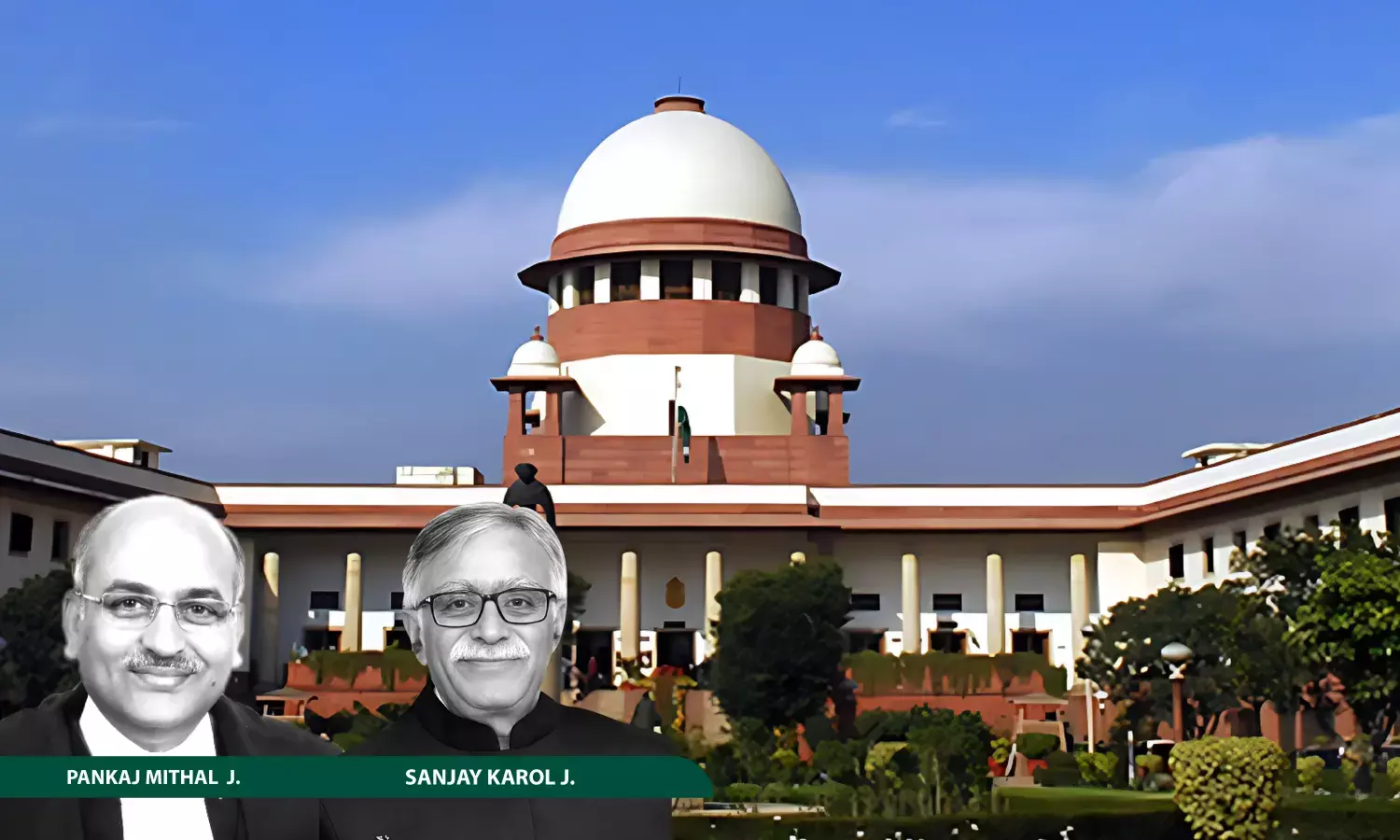Bar Of Altering Judgment U/S. 362 CrPC Almost Absolute; Remedying Abuse Of Process of Law & Meeting Ends Of Justice Are The Only Exceptions: Supreme Court
The appeals before the Supreme Court challenged the judgment in which an FIR that had earlier been quashed was restored.

Justice Pankaj Mithal, Justice Sanjay Karol, Supreme Court
The Supreme Court has ruled that the bar under section 362 of the Code of Criminal Procedure, 1973, for altering/reviewing a judgment is almost absolute. The only exceptions to the bar, which would permit the invocation of inherent powers, would be if it is necessary to meet the ends of justice or to remedy the abuse of the process of law.
The appeals by special leave before the Apex Court called into question the correctness of the judgment of the Punjab and Haryana High Court, in which an FIR that had earlier been quashed and set aside was restored to the file and the concerned authorities were directed to restart the investigation.
Considering the fact that the High Court adopted the course it did without reference to the well-established position of law, the Division Bench comprising Justice Pankaj Mithal and Justice Sanjay Karol held “The bar under Section 362 Cr.P.C. is almost absolute. The only exceptions to the bar, which would then permit the invocation of inherent powers, would be if it is necessary to meet the ends of justice; or to remedy the abuse of the process of law. Other than the above two circumstances, such inherent powers do not permit the doing of what stands prohibited by the text of the statute.”
“To clarify, it may be stated that when a Court finds itself in such extraordinary circumstances, the reasons for exercising such power should be recorded, justifying the invocation thereof, it added.
Advocate A.R. Takkar represented the Appellants while AAG Dr. Hemant Gupta represented the Respondents.
Factual Background
The genesis of the dispute is an agreement to sell entered into between the parties. Various disputes arose regarding these agreements, and finally, with the intervention of elders and others, a fresh agreement to sell was entered into in supersession of all other agreements. Accordingly, the sale consideration was decided at Rs 2,25,00,000. Various methods were decided upon to transfer part of the said amount, totaling Rs. 35 lakh. The remaining amount was to be paid at the time of registry along with interest. Also, pursuant to the fresh agreement to sell a compromise deed was inked to bring all litigations between the parties to an end. Consequently, the order which quashed the proceedings came to be passed.
However, the spirit of the compromise deed was lost upon the parties as soon after the quashing order was passed, the complainant filed an application praying for revival of the FIRs but the same was rejected. Another prayer of a similar nature seeking the revival of the FIRs was made before the High Court. By way of the impugned judgment, the revival of the FIRs was ordered. Aggrieved, the appellants approached the Apex Court.
Reasoning
The Bench, at the outset, explained that as per section 362 of the CrPC, a Court shall not, once it has signed the judgment or final order disposing of a case, alter or review the same, except to correct an error clerical or arithmetic. Reference was made to the judgment in State of Punjab v. Davinder Pal Singh Bhullar (2011) wherein it has been observed that if a judgment has been pronounced without jurisdiction or in violation of principles of natural justice or where the order has been pronounced without giving an opportunity of being heard to a party affected by it or where an order was obtained by abuse of the process of court which would amount to its being without jurisdiction, inherent powers can be exercised to recall such order for the reason that in such an eventuality the order becomes a nullity and the provisions of Section 362 CrPC would not operate.
“ It can be seen from the above pronouncements that the role of the Court, after a judgment has been delivered, is circumscribed by the law itself. In the present facts, the only provision of law, that permits an alteration in the judgment, in its own terms, was not resorted to. What was done was a review of the judgment quashing the proceedings. That, in the considered view of this Court, was not permissible”, it said.
As per the Bench, once the criminal cases have been quashed, under Section 482 CrPC on the ground of compromise entered into between the parties, one of the parties violating the terms thereof is a ground entirely foreign to law, to once again invoke such powers and recall the order of quashing. Thus, finding the impugned judgment to be passed by the High Court without any authority, the Bench allowed the appeal.
“We direct the Registry to circulate a copy of this judgment to all High Courts, for necessary dissemination to all concerned. It is our hope that lending clarity, coupled with the necessary information being supplied would curb such unjustified use of power”, it concluded.
Cause Title: Raghunath Sharma & Ors. v. State of Haryana & Anr. (Neutral Citation: 2025 INSC 723)
Appearance
Appellants: Advocate A.R.Takkar, AOR A. Venayagam Balan, Advocates Shriya Takkar, Manan Takkar, Unnati Anand, V.santhanalakshmi, Puneet Thakur
Respondents: AAG Dr. Hemant Gupta, AOR Samar Vijay Singh, Advocates Payal Gupta, Sabarni Som, Fateh Singh, Rony John, Vineeta Tiwari, Aman Dev Sharma, V. D. Khanna
Bar Of Altering Judgment U/S. 362 CrPC Almost Absolute: SC
The Supreme Court has ruled that the bar under section 362 of the Code of Criminal Procedure for altering/reviewing a judgment is almost absolute. The only exceptions to the bar, which would permit the invocation of inherent powers, would be if it is necessary to meet the ends of justice or to remedy the abuse of the process of law.

